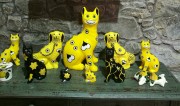St Andrews is full of interesting features and attractions, but above all else, this town is famous as the home of golf.
This year the 150th Open Championship will play out on the Old Course and such a historic event offers an excuse to look back at where the sport has come from.
The core rules of golf haven’t changed much since the first Open in 1860, but today’s equipment is a little more advanced. There won’t be any professionals sporting hickory clubs around the course and while it might seem like they’re a relic of the past, that’s not entirely true. Thanks to establishments like the St Andrews Golf Company and Kingarrock Hickory Course, wooden golf clubs still have a place in the sport today.
Golf has been played in Scotland since at least the 1400s when King James II banned it for distracting young men who should have been training for war. Whilst the title of “oldest golf course in the world” is a hotly contested subject, a charter from 1552 officially awards that record to the internationally famous Old Course in St Andrews.
With the establishment of what would become the Royal and Ancient Golf Club in 1754, this corner of Fife became one of the most important golfing centres in the country. More players meant more opportunities for local entrepreneurs and St Andrews became a hub for golf-related industries. Times may have changed but there are still some historic businesses found in this corner of Fife to accompany its legendary golf courses.
The St Andrews Golf Company has roots as far back as 1881, in a company founded by blacksmith George Nicoll. This enterprising business would go on to pioneer aspects that we still recognise in golf clubs today, including a set of irons with approximate hitting distances stamped on the reverse. However, as the modern game developed and the equipment changed alongside it, some businesses struggled to adapt.
Joining forces with other club manufacturers in the area allowed the St Andrews Golf Company to survive where many didn’t. They are now the oldest in the world and surprisingly the only one left anywhere near the home of golf. It also happens to be the last place on earth where hickory golf clubs are made using original processes right from start to finish.
The three companies included under the St Andrews Golf Co name have provided clubs to some of the biggest names in golfing history, including previous Open winners such as Bobby Jones. They might be full of history, but that doesn’t mean they’re a museum. A small team of skilled artisans with years of experience, along with decades of company heritage, are still busy in their workshop in Largoward.
The same traditional techniques that supplied those legendary golfers are being put to good use today in manufacturing authentic hickory golf clubs. These are more than just reproductions; they’re the real thing and every club is made to the exact same specifications using identical materials as when the business started all those years ago.
The head of each club starts as a simple block of wood before being shaped using a metal template, ensuring that every piece created is exactly the same. Once finished, part of the wood is hollowed out and filled with lead to bring the piece up to the correct weight. The hickory that gives the clubs their name is then used for the shaft, the perfect material to provide just enough flex while being strong enough to withstand the swing.
Each finished club is sanded down by hand by a skilled craftsman, using their experience and judgement to get the feel just right. Leather straps complete the handle and wrapped twine protects the join between shaft and head.
A visit to St Andrews Golf Company’s factory or shop shows just how many styles of hickory clubs exist. There’s something for every scenario; one slotted to sift through sand, another the perfect shape to dig out of ruts and even the curiously named Sunday Sticks. These are golf clubs disguised as walking sticks, allowing players to partake in spontaneous, forbidden matches during the holy Sabbath.
These aren’t just toys or mementoes though; if handled correctly then they can strike a ball almost as well as the most advanced equipment. Today’s clubs tend to have large, forgiving sweet spots that make it easier to achieve longer drives, essential in the modern game. Hickory golf is much less about how far you can hit the ball and much more about being accurate while strategically managing the course. There’s even somewhere nearby that golfers can discover that for themselves.
Kingarrock Hickory Golf is one of the most picturesque courses in the world, consisting of 9 holes set in the rolling parkland of Hill of Tarvit Mansionhouse. The original layout was set up in 1924 by the owner Frederick Sharp and his son Hugh, both enthusiasts of the game. After both men had tragically passed away, the course was converted to essential farmland during World War II and left that way for over 60 years.
Thankfully, the National Trust for Scotland discovered the original plans for the course along with Frederick’s golfing bag and set about resurrecting Kingarrock. It’s been a raging success and is now available to book for those looking to enjoy golf the old-fashioned way. Edwardian dress is optional but using a set of five original hickory clubs and a replica 1920s ball is not. After this unique experience, players finish off in style with ginger beer and shortbread back in the forester’s cottage.
The heritage behind St Andrews and the special status of the Old Course has made the town an essential destination for golfers around the world. Fans of the sport want to see where it began and stand on the same spot, playing in the same settings as legends did before them. When it comes to the history of the game though, that golfing pilgrimage isn’t really complete without a visit to both the St Andrews Golf Company and Kingarrock Hickory Golf.
Storytelling by Scotland's Stories





